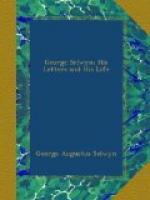Charles was yesterday very abusive upon Johns(t)on.(175) Lord N(orth) said in his reply that the gentleman was at a great distance; that if he had been on the spot, he would have given him as good an answer then as he had done on other occasions. We shall sit, I believe, till about the 11th of next month. John says, in regard to the East India business, we are now all afloat. It is a recommencer. I should, if I was the Minister, put (it?) into his hands for dispatch.
Mr. Raikes has sent to me this morning to know how George does. I sent him word that he was very well, that I heard from him, and that he had particularly desired to be remembered to him.
(173) The first hvraison was published in 1779; Johnson completed the work in 1781.
(174) Alexander Wedderburn (1733-1805). He was appointed Solicitor-General in 1771 and Attorney-General in 1778. He was created a peer as Lord Loughborough on his appointment as Chief Justice of the Common Pleas. In 1793 he reached the Woolsack, and in 1801 was created Earl of Rosslyn. Beginning political life as a Tory, he presently became a Whig and an opponent to Lord North; then he took office under him. A member of the Coalition Cabinet of Fox and North on its fall he became leader of the Whigs in the House of Lords, only to conclude his official life as Lord Chancellor in Pitt’s administration.
(175) George Johnston (1730-1787), sometimes called “Governor” Johnston; a naval officer. He became Governor of West Florida in 1763, in 1768, having returned to England, he became member for Cockermouth, and in 1778 he was appointed a commissioner to treat with America, from which, by reason of a partisan letter, he was obliged to withdraw. In 1779 ne was appointed commodore of a small fleet. In 1781 he was again returned to Parliament. He was a violent and self-advertising politician.
1781, Nov. 17, Saturday night.—I do not know how I shall conclude my letter, but I begin it in no better spirits than I can have, when I reflect, as I can never help doing, upon a loss which I sustained this day; it is now thirty years, and which as many more, although they will certainly annihilate the reflection of, can never repair. I will not be so unjust to the kindness which I have received from you and some others as to say that when I lost my father I lost the only friend I could have, but I most undoubtedly lost the best, and being to-day where that happened, and more at leisure to recollect it, je la sens, cette perte, avec la meme vivacite aujourd’hui, que je ne l’eusse faite que depuis trots jours.
I set my heart therefore particularly on receiving to-day a letter from you, et la ’voici. It is a great consolation to me, as that it proves to me, with manifold other arguments, that whatever may be your occupation, you will find a moment to tell me, what if you did not I should have not the least doubt of, and that neither business or distance will deprive me of the place which I have always maintained in your mind and regard.




